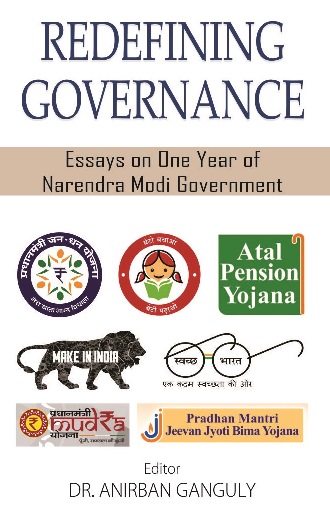-
The General Elections in India in May 2014 were historic in more than one way. Under the leadership of Narendra Modi, the Bharatiya Janata Party (BJP) won with a thumping majority indicating that the people of this country yearned for a political change. Importantly, Modi did not have a dynastic background. What were the issues that played such a crucial role in bringing about this change? What must have galvanised the electorate were the election promises to project the capability of India as a great power, its intellectual resources and the ability to emerge as a sustaining centre for economic development in a multipolar world. These interests rightly reflected the mood of the country.
The book is a collection of essays by prominent personalities covering five core areas of India’s activity — governance, defence, foreign policy, economy and social spheres. These experts have evaluated the Modi Government’s track record for one year in the above mentioned areas.
In the first section on governance, all the contributors are of the view that, the foundation for change has been laid. The road map for all round upliftment of the citizens by empowering them, measures to alleviate poverty and to usher in a new paradigm of governance. A paradigm that involves all the sections of the society. Another important issue discussed in this context is the idea of India and Indians. Mention must be made of the two articles on the northeast, which discuss the aim of not only to amalgamate the region with the mainland through connectivity and infrastructure projects, but also by raising the status of ‘Look East Policy’ to ‘Act East Policy’. Such an approach would enhance cooperation with the neighbours and also lead to the development of the region. The Act East Policy envisages promotion of tourism, setting up of regional skill grid to encourage the youth among other measures.
The next set of essays focus on Defence. The Modi Government’s emphasis on diversification of arms procurement as well as to indigenise the arms industry has been highlighted. Linked with this dual approach is the innovative slogan ‘Make in India’ by inviting foreign industrial units to establish their enterprises in the country. It is expected that, such an approach would make India not only strong, but a self-reliant nation as well. The importance of nuclear science and technology for security including energy security has also been highlighted.
It is, however, in the field of foreign policy that, there are striking achievements. Perceived as lacking experience in matters of foreign policy, the Modi Government has raised India’s international prestige and profile to new heights. Viewed as a decisive leader PM Modi has been able to reach out to neighbours, countries of the extended neighbourhood and major powers. He has successfully promoted India’s interests abroad in strategic, security economic fields and built bridges with countries that share India’s rich cultural legacy. One of the outstanding achievements of the Government is the resolution of the acrimonious issue ‘Land Boundary’ settlement with Bangladesh. The concept of Team India involves the role of the states in the making of the foreign policy.
In the economic sphere the thrust of the Government has been on development. The slogan ‘Make in India’ denotes a comprehensive approach that includes efforts to improve the ‘ease of doing business’ and of increasing the competitiveness of the Indian economy. It is also recognised that small and medium enterprises also have a role to play in the economy. The setting up of the MUDRA Bank testifies to this fact.
In the last section some of the commendable initiatives are the ‘Swachh Bharat Abhiyan’ due attention to be paid to the ‘girl child’ in education. The thrust is also on managing the vast diversity by engaging with the people and the endeavour is to involve the people for their betterment and for that of the country.
What is common to the contributors is that the one year was spent in laying the ground work for the future. It was as mentioned “The first year is just the beginning of the process. It just sets the road rolling. The nation is to walk on it now” (p 86). The Modi Government has launched the right measures in all spheres of activity. These are focussed on developing the economy, raising India’s prestige in world affairs and in the social sector some commendable initiatives have already been launched. All these steps have raised people’s expectation from the government. The nation would be keenly watching the Modi Government’s implementation of the various schemes, and programmes.
Generally speaking the initiation process is comparatively easier, than the next one of sustaining the momentum and taking it forward. In the coming year the challenge for the Government would be how to meet people’s enhanced expectations? The success of ‘Make in India’ would depend partly on India’s diplomatic skills and partly on the ability of the Government to create the requisite environment within the country. In foreign policy, the challenge would be in securing a permanent seat for India in the Security Council of the United Nations. It would, indeed be a major milestone in Indian history. However, in the social sphere the several programmes have to be taken forward. It would be interesting to follow up the developments in the current year. A sequel to the present book would be in order.
Those interested in examining in detail some of the measures will find a selection of Modi’s speeches on critical issues. The essays are written in an easy style which makes the book interesting as well as readable.
The reviewer is a former professor at the School of International Studies, JNU, and Director, India Central Asia Foundation, New Delhi
(The views expressed are the author's own and do not necessarily reflect the position of the organisation)

